(1 Samuel 11:6, 7; Judges 15:14-15) Why Did Men Such as King Saul and Samson Act Out in Violence When Filled With the Spirit of God?
“And the Spirit of God came upon Saul when he heard those tidings, and his anger was kindled greatly. And he took a yoke of oxen, and hewed them in pieces, and sent them throughout all the coasts of Israel by the hands of messengers, saying, Whosoever cometh not forth after Saul and after Samuel, so shall it be done unto his oxen. And the fear of the LORD fell on the people, and they came out with one consent.” (1 Samuel 11:6, 7)
“And when he (Samson) came unto Lehi, the Philistines shouted against him: and the Spirit of the LORD came mightily upon him, and the cords that were upon his arms became as flax that was burnt with fire, and his bands loosed from off his hands. And he found a new jawbone of an ass, and put forth his hand, and took it, and slew a thousand men therewith.” (Judges 15:14-15)
King Saul
When we look at the life of King Saul and how God dealt with him, we cannot focus on a single verse, nor a single story. In order to take the Bible just as it reads, we must use all the Bible and read what it says about that topic.
It was the people of Israel who demanded a human king to judge and fight for them. To teach them of their wrong course, God accommodated their request:
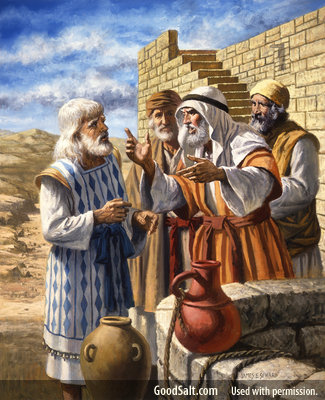 “Then all the elders of Israel gathered themselves together, and came to Samuel unto Ramah, And said unto him, Behold, thou art old, and thy sons walk not in thy ways: now make us a king to judge us like all the nations. But the thing displeased Samuel, when they said, Give us a king to judge us. And Samuel prayed unto the LORD. And the LORD said unto Samuel, Harken unto the voice of the people in all that they say unto thee: for they have not rejected thee, but they have rejected Me, that I should not reign over them.” (1 Samuel 8:4-7)
“Then all the elders of Israel gathered themselves together, and came to Samuel unto Ramah, And said unto him, Behold, thou art old, and thy sons walk not in thy ways: now make us a king to judge us like all the nations. But the thing displeased Samuel, when they said, Give us a king to judge us. And Samuel prayed unto the LORD. And the LORD said unto Samuel, Harken unto the voice of the people in all that they say unto thee: for they have not rejected thee, but they have rejected Me, that I should not reign over them.” (1 Samuel 8:4-7)
Even after Samuel foretold the character of their king and how wicked he would be, the people still demanded one (verses 8-21). God then said, “Hearken unto their voice, and make them a king” (verse 22).
On the day of the coronation of their new king we read:
“And Samuel called the people together unto the LORD to Mizpeh; And said unto the children of Israel, Thus saith the LORD God of Israel, I brought up Israel out of Egypt, and delivered you out of the hand of the Egyptians, and out of the hand of all kingdoms, and of them that oppressed you: And ye have this day rejected your God, who Himself saved you out of all your adversities and your tribulations; and ye have said unto Him, Nay, but set a king over us. Now therefore present yourselves before the LORD by your tribes, and by your thousands.” (1 Samuel 10:17-19)
Again, Samuel reiterates that they have rejected God and the only reason they are getting a human king is because God is accommodating them. Now read what verses 20-24 say:
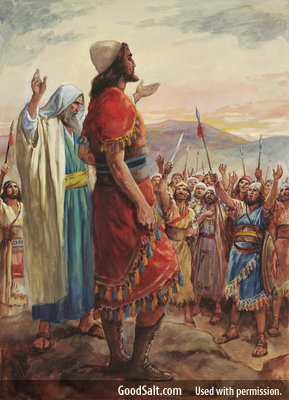 “And when Samuel had caused all the tribes of Israel to come near, the tribe of Benjamin was taken. When he had caused the tribe of Benjamin to come near by their families, the family of Matri was taken, and Saul the son of Kish was taken: and when they sought him, he could not be found. Therefore they inquired of the LORD further, if the man should yet come thither. And the LORD answered, Behold, he hath hid himself among the stuff. And they ran and fetched him thence: and when he stood among the people, he was higher than any of the people from his shoulders and upward. And Samuel said to all the people, See ye him whom the LORD hath chosen, that there is none like him among all the people? And all the people shouted, and said, God save the king.”
“And when Samuel had caused all the tribes of Israel to come near, the tribe of Benjamin was taken. When he had caused the tribe of Benjamin to come near by their families, the family of Matri was taken, and Saul the son of Kish was taken: and when they sought him, he could not be found. Therefore they inquired of the LORD further, if the man should yet come thither. And the LORD answered, Behold, he hath hid himself among the stuff. And they ran and fetched him thence: and when he stood among the people, he was higher than any of the people from his shoulders and upward. And Samuel said to all the people, See ye him whom the LORD hath chosen, that there is none like him among all the people? And all the people shouted, and said, God save the king.”
As a result of this, Saul was chosen to be king, a ruthless tyrant and a man of war. Notice here that it says that the Lord had chosen Saul, but remember, God is only giving Israel what they desired.
All through his kingly career God was reaching out to Saul, but Saul’s selfishness and thirst for blood kept him from accepting the true King. God never desired for them to have such a king, but all needed to see their own hearts and how far they were from God. In the very next chapter, we read something interesting:
“Soon Nahasha the Ammonite came up and laid siege to Jabesh-gilead. All the men of Jabesh said to him, ‘Make a treaty with us, and we will serve you.’ But Nahash the Ammonite replied, ‘I will make a treaty with you on one condition, that I may put out everyone’s right eye and bring reproach upon all Israel.’ ‘Hold off for seven days,’ replied the elders of Jabesh, ‘and let us send messengers throughout Israel. If there is no one to save us, we will surrender to you.’ When the messengers came to Gibeah of Saul and relayed these words in the hearing of the people, they all wept aloud. Just then Saul was returning from the field, behind his oxen. ‘What troubles the people?’ asked Saul. ‘Why are they weeping?’ And they relayed to him the words of the men from Jabesh. When Saul heard their words, the Spirit of God rushed upon him, and he burned with anger. He took a pair of oxen, cut them into pieces, and sent them by messengers throughout the land of Israel, proclaiming, 'This is what will be done to the oxen of anyone who does not march behind Saul and Samuel.' Then the terror of the LORD fell upon the people, and they turned out as one man. And when Saul numbered them at Bezek, there were 300,000 Israelites and 30,000 men of Judah. So they said to the messengers who had come, ‘Tell the men of Jabesh-gilead: Deliverance will be yours tomorrow by the time the sun is hot.’ And when the messengers relayed this to the men of Jabesh, they rejoiced. (1 Samuel 11:1-9, Berean Study Bible)
Did the Spirit of God really work through Saul to become so enraged that he tore apart a pair of oxen and caused fear among the people? Is this how God’s Spirit works? David tells us that God’s Spirit is His very presence:
“Do not cast me away from Your presence, And do not take Your Holy Spirit from me.” (Psalm 51:11)
“Whither shall I go from thy Spirit? or whither shall I flee from thy presence?” (Psalm 139:7)
In both passages David is using Hebraic parallelism in which he uses two different words to identify the same thought. Here, the two words that mean the same are “spirit” and “presence.”
Is God’s Spirit (presence) violent at times? In Isaiah 53 we read a Messianic prophecy concerning the character of Jesus saying, “… He had done no violence, neither was any deceit in His mouth” (Isaiah 53:9). Jesus is “the brightness of His (Father’s) glory, and the express image of His (Father’s) person” (Hebrews 1:3). Therefore, since Jesus “had done no violence”, we can be assured that God never does anything violent. Jesus told Philip: “he that hath seen Me hath seen the Father” (John 14:9).
In 2 Samuel 22:3 David sings, “… Thou (God) savest me from violence.” In Psalm 72:14 he says God will redeem our souls “from deceit and violence.” In prophetic language symbolic of Satan, Ezekiel writes, “they have filled the midst of thee with violence, and thou hast sinned … O covering cherub.” (Ezekiel 28:16). It is Satan who is the instigator of violence.
In everything Jesus did He was revealing the character of His Father who had given Him His Spirit. When Jesus stood up to read on one Sabbath, Luke records that He read from the book of Isaiah which says:
“The Spirit of the Lord is upon Me, because He hath anointed Me to preach the gospel to the poor; He hath sent Me to heal the brokenhearted, to preach deliverance to the captives, and recovering of sight to the blind, to set at liberty them that are bruised, To preach the acceptable year of the Lord. And He closed the book, and He gave it again to the minister, and sat down. And the eyes of all them that were in the synagogue were fastened on Him. And he began to say unto them, This day is this scripture fulfilled in your ears.” (Luke 4:18-21; see Isaiah 61:1, 2)
We see here, that when Jesus was filled with the Spirit of God, He would “preach the gospel to the poor”; “heal the brokenhearted”; “preach deliverance to the captives”; enter a work of “recovering of sight to the blind”; “set at liberty them that are bruised.” Nothing violent here.
At Christ’s baptism Matthew records:
 “And Jesus, when He was baptized, went up straightway out of the water: and, lo, the heavens were opened unto Him, and He saw the Spirit of God descending like a dove, and lighting upon Him.” (Matthew 3:16)
“And Jesus, when He was baptized, went up straightway out of the water: and, lo, the heavens were opened unto Him, and He saw the Spirit of God descending like a dove, and lighting upon Him.” (Matthew 3:16)
Is a dove a violent creature? No. To His disciples Jesus said, "Behold, I send you forth as sheep in the midst of wolves: be ye therefore wise as serpents, and harmelss as doves" (Matthew 10:16). The Spirit upon Christ in the form of a dove represents the meek, lowly and HARMLESS Spirit (presence/character) of Christ who was filled with the HARMLESS Spirit of His Father. Jesus told His disciples it was His Father doing His works through Him:
“Believest thou not that I am in the Father, and the Father in Me? the words that I speak unto you I speak not of Myself: but the Father that dwelleth in Me, He doeth the works.” (John 14:10)
Jesus taught us that “to do good” is “to save life” but “to do evil” is “to kill” (Mark 3:4). Does God’s Spirit ever do anything evil? No. (See the article entitled: Why Does God Say He Will Repent of Doing Evil? if you question this). After Jesus spoke those words, Mark records that “He (Jesus) looked round about on them with anger, being grieved for the hardness of their hearts …” (Mark 3:5a). This sounds like Saul’s experience we read earlier when “he burned with great anger” just before cutting the two oxen to pieces in a violent rage. However, notice the difference in the anger Jesus experienced compared to Saul’s. Jesus’ anger is defined as Him “being grieved for the hardness of their hearts” and then He healed a man with a withered hand (Mark 3:5b). Jesus’ anger is expressed by His intense grief knowing that their closed minds and stubborn hearts were going to destroy them. His anger was not motivated by hatred towards them, but by His compassion for them, longing that they accept Him and His message of His Father’s love to heal their hearts and minds. Saul’s anger was motivated by pure hatred which can be seen by the way he lashed out to cause harm upon others.
Paul then tells us that we will be given the same Spirit that was given to Jesus:
“And because ye are sons, God hath sent forth the Spirit of His Son into your hearts, crying, Abba, Father. Wherefore thou art no more a servant, but a son; and if a son, then an heir of God through Christ.” (Galatians 4:6, 7)
So, did King Saul really manifest the Spirit of Jesus? Hardly!
Why Did Saul Act Violently
When the Spirit of God Came Upon Him?
Like all of us, Saul was full of sin and selfishness. When God’s Spirit (presence) came to Saul, Saul’s wicked spirit (character) reacted violently. Paul writes:
“For the mind that is set on the flesh is hostile to God, for it does not submit to God’s Law; indeed, it cannot.” (Romans 8:7, English Standard Version)
Saul’s mind (his sinful reasoning) was hostile to the meek and lowly Spirit of God. This friction (resistance) caused a natural reaction that imitated his own violent character. In Galatians chapter 5 Paul teaches us:
“For the flesh desires what is contrary to the Spirit, and the Spirit what is contrary to the flesh. They are in conflict with each other, so that you are not to do whatever you want.” (Galatians 5:17, New International Version)
Here’s how the Amplified version puts it (words in brackets are in the original):
“For the sinful nature has its desire which is opposed to the Spirit, and the [desire of the] Spirit opposes the sinful nature; for these [two, the sinful nature and the Spirit] are in direct opposition to each other [continually in conflict], so that you [as believers] do not [always] do whatever [good things] you want to do.”
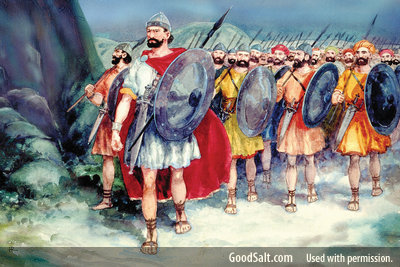 Saul’s sinful nature was constantly rejecting the Spirit of God. His own preconceived idea of who God is was controlling his thoughts and actions. They had all wrongly believed that “The LORD (Jehovah) is a man of war” (Exodus 15:3). We know this to be false because of David’s words as to why he was not permitted to build the Temple of God:
Saul’s sinful nature was constantly rejecting the Spirit of God. His own preconceived idea of who God is was controlling his thoughts and actions. They had all wrongly believed that “The LORD (Jehovah) is a man of war” (Exodus 15:3). We know this to be false because of David’s words as to why he was not permitted to build the Temple of God:
“But God said unto me, Thou shalt not build an house for My name, because thou hast been a man of war, and hast shed blood.” (1 Chronicles 28:3)
Then in the Psalms David wrote, “Except the LORD build the house, they labour in vain that build it …” (Psalm 127:1). The LORD could not build the house if He was a man of war, unless He was a hypocrite.
Saul’s man-of-war-nature was in conflict with God’s Spirit. Paul describes the difference between our fallen nature with God’s Spirit:
“Now the works of the flesh are manifest, which are these; Adultery, fornication, uncleanness, lasciviousness, Idolatry, witchcraft, hatred, variance, emulations, wrath, strife, seditions, heresies, Envyings, murders, drunkenness, revellings, and such like: of the which I tell you before, as I have also told you in time past, that they which do such things shall not inherit the kingdom of God.” (Galatians 5:19-21)
“But the fruit of the Spirit is love, joy, peace, longsuffering, gentleness, goodness, faith, Meekness, temperance: against such there is no law. And they that are Christ's have crucified the flesh with the affections and lusts. If we live in the Spirit, let us also walk in the Spirit. Let us not be desirous of vain glory, provoking one another, envying one another.” (Galatians 5:22-26)
Saul’s flesh acted out in violence against the promptings of the Holy Spirit. Saul had not crucified the works of the flesh, but had crucified the Spirit of Christ, thus the works of his flesh were manifested. Jesus never acted out in violence or went on a killing spree when filled with God’s Spirit because He had no violence in Him to begin with. Jesus said, “… for the prince of this world cometh, and hath nothing in Me.” (John 14:30). Please see the article entitled: Didn’t Jesus Show Violence and Anger When He Kicked the Moneychangers Out of the Temple? if you question this.
Example of Elijah
We find another example of this in the prophet Elijah.
 “And He (God) said, Go forth, and stand upon the mount before the LORD. And, behold, the LORD passed by, and a great and strong wind rent the mountains, and brake in pieces the rocks before the LORD; but the LORD was not in the wind: and after the wind an earthquake; but the LORD was not in the earthquake: And after the earthquake a fire; but the LORD was not in the fire: and after the fire a still small voice.” (1 Kings 19:11, 12)
“And He (God) said, Go forth, and stand upon the mount before the LORD. And, behold, the LORD passed by, and a great and strong wind rent the mountains, and brake in pieces the rocks before the LORD; but the LORD was not in the wind: and after the wind an earthquake; but the LORD was not in the earthquake: And after the earthquake a fire; but the LORD was not in the fire: and after the fire a still small voice.” (1 Kings 19:11, 12)
We see here, as God’s presence neared Elijah, there was “a great and strong wind,” then “an earthquake,” then “a fire”, but the LORD was not in the wind, nor the earthquake, nor the fire. Where then did the wind, earthquake and fire come from? Were these not manifestations of Elijah’s violent spirit as it came into conflict with God’s meek and lowly Spirit represented by the “still small voice”?
In Luke chapter 9 we read:
“Now it came to pass, when the time had come for Him to be received up, that He steadfastly set His face to go to Jerusalem, and sent messengers before His face. And as they went, they entered a village of the Samaritans, to prepare for Him. But they did not receive Him, because His face was set for the journey to Jerusalem. And when His disciples James and John saw this, they said, ‘Lord, do You want us to command fire to come down from heaven and consume them, just as Elijah did?’ But He turned and rebuked them, and said, ‘You do not know what manner of spirit you are of. For the Son of Man (Messiah/Jesus) did not come to destroy men’s lives but to save them.’ And they went to another village.” (Luke 9:51-56, New King James Version)
We clearly see here that the disciples’ violent nature was being compared to the evil spirit Elijah manifested when he called down fire to consume his enemies (2 Kings 1:9-12). “But wait!” someone will object, “Verse 12 plainly says, “And the fire of God came down from heaven and consumed him (the captain) and his fifty.” Yes, it does, but let us not forget the story of Job where God permitted Satan to attack Job by saying:
“Behold, all that he (Job) hath is in thy (Satan’s) power; only upon himself put not forth thine hand. So Satan went forth from the presence of the LORD.” (Job 1:12)
Then in verse 16 we read:
“While he (Job) was yet speaking, there came also another, and said, The fire of God is fallen from heaven, and hath burned up the sheep, and the servants, and consumed them; and I only am escaped alone to tell thee.”
If the people during Job’s time didn’t fully understand who was causing the fire, believing it was God instead of Satan, couldn’t the people living during Elijah’s time wrongly think the same? After all, doesn’t the world wrongly believe the same today when our insurance companies allow us to claim “natural disasters” as “Acts of God”?
Samson
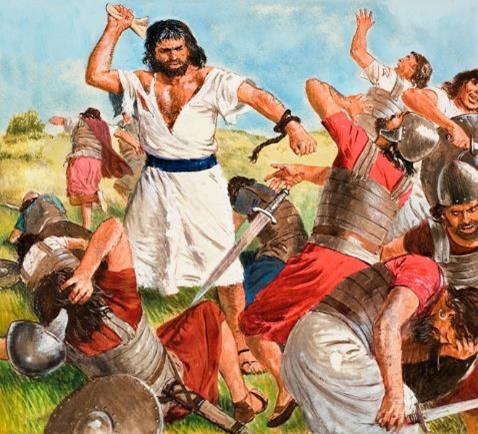 "And when he (Samson) came unto Lehi, the Philistines shouted against him: and the Spirit of the LORD came mightily upon him, and the cords that were upon his arms became as flax that was burnt with fire, and his bands loosed from off his hands. And he found a jawbone of an ass, and put forth his hand, and took it, and slew a thousand men therewith." (Judges 15:14, 15)
"And when he (Samson) came unto Lehi, the Philistines shouted against him: and the Spirit of the LORD came mightily upon him, and the cords that were upon his arms became as flax that was burnt with fire, and his bands loosed from off his hands. And he found a jawbone of an ass, and put forth his hand, and took it, and slew a thousand men therewith." (Judges 15:14, 15)
Again, the question is asked, “How can it be according to the character of God for the Spirit of the LORD to come upon Samson and then he kill a thousand men?” Like Saul, the words “came mightily upon” give the impression of the Spirit of Christ entering into Samson and doing the work, but can we imagine the “holy, harmless, and undefiled” (Hebrews 7:26) Son of God doing such a thing? God forbid.
Let us look at the Hebrew and see a little deeper as to what it means when the Spirit of the LORD comes upon someone. The Hebrew word is צָלַח and is almost always translated “to prosper.” This is how the Young’s Literal Translation has it:
“… and the Spirit of Jehovah prospereth over him … his bands are wasted from off his hands, and findeth a fresh jaw-bone of an ass, and putteth forth his hand and taketh it, and smiteth with it – a thousand men. (Judges 15:14-15)
A better understanding of the Spirit prospering men like Saul and Samson is God allowed them to win, or protected them in battle, rather than Jesus being in them doing the killing.
Another example of this use of “prosper” is here:
“Thus saith the Lord, Behold, I will give this city into the hand of the king of Babylon, and he shall take It ... And he shall lead Zedekiah to Babylon, and there shall he be until I visit him, saith the Lord: though ye fight with the Chaldeans, ye shall not prosper.” (Jeremiah 32:3, 5)
God wanted Israel to win over the nations by the righteousness of its government, the uprightness of its Laws, and the moral integrity of its citizens. They were to be “a light to the Gentiles” and a channel of God’s “salvation unto the end of the earth” (Isaiah 49:6). But Israel followed the other nations into warring, into having a king, into idolatry. Even though it is not God’s original plan, still no king, army, or government can prosper without the Spirit of God. Again, “the Spirit of the LORD” coming upon men like Saul and Samson can be understood in this sense – God gave them the confidence, the vigor, and the vitality to succeed, though it is not Christ’s character nor actions working through them. In Hebrews chapter 11 Paul refers to this:
"And what more shall I say? Time will not allow me to tell of Gideon, Barak, Samson, Jephthah, David, Samuel, and the prophets, who through faith conquered kingdoms, administered justice, and gained what was promised; who shut the mouths of lions, quenched the raging fire, and escaped the edge of the sword; who gained strength from weakness, became mighty in battle, and put foreign armies to flight." (Hebrews 11:32-34)
Although they acted in faith, God was working through their shortcomings as He does with us today. Their faith was not yet perfected. Abraham was willing to offer his son Isaac as a sacrifice "by faith" (Hebrews 11:17-19), something that God NEVER wanted Abraham to do. God is against all forms of child sacrifice, whether in the attempt to appease false gods or to try and appease the one true God (Deuteronomy 12:29–31; Jeremiah 7:30–31). God has never, nor will ever need to be appeased by any form of sacrifice (Psalm 40:6). But because Abraham (who grew up in Babylon) had this appeasement-mindset, he misinterpreted God's words and acted out in faith believeing God would bring Isaac back to life. God tested Abraham's faith by working through Abraham's wrong mindset and actions in order to perfect his faith. After that encounter on the mountain, God healed Abraham's appeasement-mindset and gave him perfect rest in God's everlasting free forgiveness. From that time onward, there is no more mention of Abraham building altars for animal sacrifices. (Please see the article entitled: Why Did God Command Abraham to Sacrifice Isaac?) This is why Paul ended his current thought on faith by saying:
"These were all commended for their faith, yet they did not receive what was promised. God had planned something better for us, so that together with us they would be made perfect." (Hebrews 11:39, 40)
Although they acted in faith, they did not receive what was promised — the perfection of character as it is in Christ. We living at this time have been shown something far better through the life of Christ who practiced perfect faith! His perfect faith never acted out in violent killings. When we truly receive the Spirit of Christ we enter into His perfect rest, "For he that is entered into His (God's) rest, he also hath ceased from his own works ..." (Hebrews 4:10). We cease from doing our own works by entering into God's rest, which is His indwelling non-violent presence (Spirit).
"And He (God) said, My presence shall go with thee, and I will give thee rest." (Exodus 33:14)
"Come unto Me (Jesus), all ye that labour and are heavy laden, and I will give you rest." (Matthew 11:28)
God gave both Saul and Samson the power, which they received while rejecting God’s character. This is part of how God recognizes our free will. It is the same with Satan, who has much power, which all comes from God, while rejecting God’s character.
“God hath spoken once; twice have I heard this; that power belongeth unto God. Also unto thee, O Lord, belongeth mercy: for thou renderest to every man according to his work.” (Psalm 62:11-12)
Satan was granted permission to do all sorts of evil upon Job, but at the same time God was sustaining the life of Satan. Jesus said, “Without Me ye can do nothing” (John 15:5). We can’t even sin without God sustaining and upholding our life; for His Son Jesus is “upholding all things by the word of His power” (Hebrews 1:3). But this power is given in probation, with the hope that finally the character of God will be accepted and therefore a man may enter into everlasting life.
All our deeds are done through the power of God, even those done by wicked men. The graceful pianist, the great football player, the ultra-marathon runner – all owe their vitality and growth to the power of God. The issue is whether we recognize that power is coming from God, repent of using it sinfully (selfishly), and turn back to Him and live according to His will (in His character); or we accept life/power from God in the Spirit of Satan, thus torturing “Christ, the power of God” (1 Corinthians 1:24) by using it for wickedness and sin, eventually leading to our everlasting death.
In permitting this to be done, God was reaching out to them so they could see their own weakness and sinful character. Samson, like many of us, was acting under competing principles of life: the desire of the Spirit of Christ in us to honor God and the desire of our own carnal flesh, encouraged by Satan, to honor ourselves. Because Samson had not fully hardened himself to the Spirit of God, He still had the capacity to come into repentance and fullness of faith. This must have happened, even if it took much calamity for him to get there, because Samson is one of the heroes of faith mentioned by Paul in Hebrews 11.
There are Christians in the army right now that God is answering prayers for and helping, according to their knowledge of truth. But when they learn enough, God expects them to repent even if He has worked through their former framework to reach them.
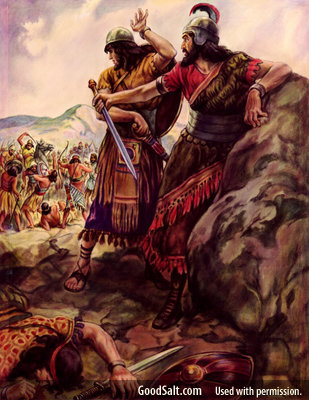 In Hosea 13:9 God says “O Israel, thou hast destroyed thyself” for wanting a king like the other nations. Then in verse 11 God says that Saul was given to the people as king “in Mine anger” (i.e., He tearfully allowed them the desires of their own hearts) and then took him away “in My wrath" (i.e., He did not prevent Saul from committing suicide). Please see the article entitled: What is God’s Wrath? for more details on this.
In Hosea 13:9 God says “O Israel, thou hast destroyed thyself” for wanting a king like the other nations. Then in verse 11 God says that Saul was given to the people as king “in Mine anger” (i.e., He tearfully allowed them the desires of their own hearts) and then took him away “in My wrath" (i.e., He did not prevent Saul from committing suicide). Please see the article entitled: What is God’s Wrath? for more details on this.
So, did God cut the oxen into pieces and kill a thousand men with a jawbone? No, God used man’s sinfulness – in this case his warlike nature – to teach a lesson and draw him closer. Men like Saul and Samson assume that their killing was what God wanted because that was how they were taught – “The LORD (Jehovah) is a man of war: the LORD (Jehovah) is His name” (Exodus 15:3).
Because of the culture of unbelief the Israelites were in during the time of the Kings and Judges, God couldn’t work acts of “mercy and self-sacrifice” through them. God could only work with events as they happened in a manner to teach everyone the best He could while still respecting their free will. The Philistines also understood only the sword mentality, and they had hardened their hearts to the extent that God could not protect them from men like Saul and Samson. God’s restraining power will be in a measure removed from the agencies of evil, so that a train of circumstances will arise which will punish sin with sin. In the cases viewed above, the sinful desires of Saul, Elijah and Samson punished and killed the hardened sinfulness of the enemies of Israel, who willfully rejected the one true God who had done nothing but loved, sustained, and served them.
“Evil shall slay the wicked: and they that hate the righteous shall be desolate.” (Proverbs 34:21)
Saul’s, Elijah’s and Samson’s killing was sin (Exodus 20:13). But in the framework they were in, they couldn’t recognize it. They thought that killing those they considered the enemies of God wasn’t sin, instead it was righteous. Elijah even acknowledged his guilt of having killed with the sword as he ran for his life from Ahab and Jezebel:
“And Ahab told Jezebel all that Elijah had done, and withal how he had slain all the prophets with the sword … But he (Elijah) himself went a day's journey into the wilderness, and came and sat down under a juniper tree: and he requested for himself that he might die; and said, It is enough; now, O LORD, take away my life; for I am not better than my fathers.” (1 Kings 19:1, 4)
Like Elijah, who was carried away into heaven without seeing death, we who are alive at the time of Christ’s second coming must acknowledge and confess our inner sinfulness, permitting God to cleanse us from all unrighteousness (1 John 1:9). The fact is, the closer we come to Jesus the more sinful we will appear. Take a look at Isaiah’s experience:
“Then said I, Woe is me! for I am undone; because I am a man of unclean lips, and I dwell in the midst of a people of unclean lips: for mine eyes have seen the King, the LORD of hosts. Then flew one of the seraphim unto me, having a live coal in his hand, which he had taken with the tongs from off the altar: And he laid it upon my mouth, and said, Lo, this hath touched thy lips; and thine iniquity is taken away, and thy sin purged.” (Isaiah 6:5-7)
Contrary to popular belief, God convicting us of sin is a good thing; for God is revealing to us what needs to be cleansed. Instead of retaliating against the conviction, let us thank Him for exposing what we are like so that we may become more like Him!
“But I (Jesus) say unto you which hear, Love your enemies, do good to them which hate you, Bless them that curse you, and pray for them which despitefully use you. And unto him that smiteth thee on the one cheek offer also the other … But love ye your enemies, and do good, and lend, hoping for nothing again; and your reward shall be great, and ye shall be the children of the Highest: for He is kind unto the unthankful and to the evil. Be ye therefore merciful, as your Father also is merciful.” (Luke 6:27, 28, 35, 36)
For more information on King Saul and God’s desire to reach him unto repentance, please see the article entitled: Why Would a God of Love Command King Saul to Kill Men, Women and Babies?


.png)


